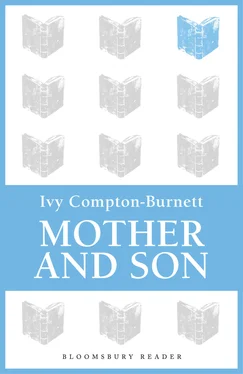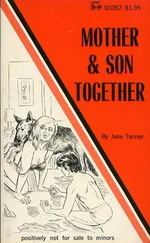Ivy Compton-Burnett - Mother and Son
Здесь есть возможность читать онлайн «Ivy Compton-Burnett - Mother and Son» весь текст электронной книги совершенно бесплатно (целиком полную версию без сокращений). В некоторых случаях можно слушать аудио, скачать через торрент в формате fb2 и присутствует краткое содержание. Год выпуска: 2013, Издательство: Bloomsbury Publishing, Жанр: Современная проза, на английском языке. Описание произведения, (предисловие) а так же отзывы посетителей доступны на портале библиотеки ЛибКат.
- Название:Mother and Son
- Автор:
- Издательство:Bloomsbury Publishing
- Жанр:
- Год:2013
- ISBN:нет данных
- Рейтинг книги:3 / 5. Голосов: 1
-
Избранное:Добавить в избранное
- Отзывы:
-
Ваша оценка:
- 60
- 1
- 2
- 3
- 4
- 5
Mother and Son: краткое содержание, описание и аннотация
Предлагаем к чтению аннотацию, описание, краткое содержание или предисловие (зависит от того, что написал сам автор книги «Mother and Son»). Если вы не нашли необходимую информацию о книге — напишите в комментариях, мы постараемся отыскать её.
Mother and Son — читать онлайн бесплатно полную книгу (весь текст) целиком
Ниже представлен текст книги, разбитый по страницам. Система сохранения места последней прочитанной страницы, позволяет с удобством читать онлайн бесплатно книгу «Mother and Son», без необходимости каждый раз заново искать на чём Вы остановились. Поставьте закладку, и сможете в любой момент перейти на страницу, на которой закончили чтение.
Интервал:
Закладка:
“Mother, it is always the occasion to be the defenders of our faith.”
“Well, you have been so,” said Miranda, whose share in her son’s beliefs did not give her his feeling for them. “I was admiring your garden, Miss Greatheart. It makes me ashamed of my own. Do you do much in it yourself?”
“As much as will escape the gardener’s notice,” said Emma, once more answering her thought.
“Well, my son and I will walk round it, and give you and Miss Wolsey an hour to yourselves. You must have a good deal to say to each other.”
“How open she is, when she knows what it must be!” said Emma. “Can she be as much worse than she seems, as the rest of us are?”
“Perhaps not. She does not edit herself. She sees no reasons.”
“But she lets other people see them. I have not met another case of it. No, pray do not leave us, dear. You are helping us through our first hour of constraint. And we have no secrets from you. Not even that I dislike Mrs. Hume’s son. And that would be a secret from anyone else.”
“There is nothing against him,” said Hester. “And he is always considerate.”
“What a sign of being employed! Grateful for consideration! I was waiting for it.”
“Well, all things come to those who wait.”
“To think what three weeks can do!”
“They have seen me become a self-supporting woman.”
“That ought to be a contradiction in terms.”
“I wish it was,” said Miss Burke.
“Oh, don’t threaten me, dear. I have much to contend against.”
“Mr. Hume and the children are all I would ask,” said Hester. “The son is a creature apart. Even his father does not know what to make of him.”
“What do you call him? You call the father ‘Mr. Hume’.”
“I call him ‘Mr. Rosebery’, as the tutor does.”
“Hester, do you stop nowhere? Copying the tutor! What sort of man is he?”
“An odd little man, precise and conscious and of another kind.”
“Then why do you copy him?”
“In this case he offered me an example.”
“I am glad I am not in Miss Wolsey’s place,” said Miss Burke.
“Think of that, Hester, when she would naturally wish to be in anyone else’s! Do not listen to me, dear. I am overwrought.”
“Mrs. Hume is enjoying her day,” said Hester. “I can see she is impressed by your prosperity.”
“Well, of course she is, when my friend is her companion. Companions are solitary and penniless. Have you no knowledge of life or literature?”
“There is not much about companions in literature.”
“So you have no knowledge of it. And now you will never get any. Or do you have to read aloud? The thought has just struck me.”
“It was suggested, but the son was jealous of the privilege. That is what he called it.”
“I never understand why she wants a companion. What can she think of my position?”
“She thinks very well of it, except that you are a spinster.”
“I never understand why women are proud of being married,” said Miss Burke.
“I do,” said Emma. “Someone has wanted to spend his life with them. That is surely a cause for pride. And they have the proof of it, that Mrs. Hume would require. You see I have begun to quote her. It is a good thing I am not a companion. I think I have almost become one. What will you do when she dies, Hester?”
“I do not believe in talking about people’s death.”
“You have to pretend she is immortal, or you would be failing in your trust. But you must know she is not. I believe even she knows it.”
“What do I know?” said Miranda, entering with her son, and assuming the subject to be herself.
“That we are not immortal,” said Emma. “Some people do not know it.”
“They need not do so until they are old. I think it is better that they should not. I have had to face it, and take thought for those who will outlive me.”
“I wish I could talk in a broad and selfless way.”
Miranda gave her a smile.
“We have had a pleasant hour. We greatly admired the garden. It is planted with an eye to the present and future, which is both wise and rare. I am sorry Miss Wolsey will miss it this year.”
“I hope you will come with me to see it sometimes,” said Hester.
“Mother,” said Rosebery, “I trust we can give Miss Wolsey opportunity to visit her friend and her garden, without the obligation to include us in the enterprise. This occasion will suffice for a happy understanding of her.”
“I must not come too often,” said Hester. “It is not wise to live two lives.”
“Miss Wolsey, may I hope there was not an undernote in that simple speech?”
“Will you have tea in the dining-room?” said Miss Burke. “You will be more comfortable there.”
“Miss Greatheart,” said Rosebery, addressing his response to his hostess, “I think our dearest and earliest memories are evoked by the words.”
“I hope Miss Wolsey will return to this house one day,” said Miranda, as they crossed the hall, “much as I sympathise with her desire for independence.”
“I do not sympathise with it,” said Emma. “I see no cause for pride in earning one’s bread. The very word puts it in its place; there could not be a barer term.”
“You and I are fortunate in being above the need to do so.”
“You see what you are really proud of. Look at your word, ‘above’.”
“We should see it as a cause for thankfulness.”
“Well, thankfulness and pride are not very different. We should not be thankful for anything we were ashamed of. When we belittle our success, it is because we dare not let our pride have its way. And if you are thankful to something for singling you out, of course you are proud; and surely you ought to be.”
“We have done nothing to earn our independence.”
“And so we are proud indeed.”
“Who is to pour out the tea?” said Miss Burke.
“Whose duty is it?” said Miranda, with a smile.
“Hester’s, when she is at home,” said Emma. “Otherwise it is Miss Burke’s.”
“I will pour it out,” said Hester. “I know the tastes of everyone here.”
She showed this knowledge too openly.
“My son takes sugar, Miss Wolsey. I know you would want me to say so.”
“I think I will have a change on this occasion, Mother.”
“No, have it as you like it, my son. Miss Wolsey would prefer that. She is pouring out the tea to ensure it.”
“Mother, I will make a variation in my habits to-day. I am getting beyond the stage of wanting everything sweetened. I remember an enjoyable cup of tea I had on Miss Wolsey’s arrival, when it fell to me to welcome her. She gave it to me sugarless, doubtless judging by my age and appearance; and I realised that my tastes were changing, indeed had changed.”
“Then why have you not said so?”
“My reasons have been several. The force of habit is strong, and the sight and sound of the sugar dropping into the cup had become dear. Even now I look for the moment when my senses will be struck by it. But my mature palate no longer craves the sweetness that was acceptable to my youth.”
“Well, you cannot have sugar put into the tea without its affecting it.”
“That is so, Mother. And therefore I have had to make my choice. And I have made it as I have said.”
“But how did Miss Wolsey know?”
“I can only think she remembered the occasion I spoke of. She has the memory of the good hostess.”
“She was not a hostess then. It is kind of her to think of it. So you have been drinking tea as you dislike it, for all these weeks?”
“Well, let us say as I once liked it.”
“I did not know you were so childish.”
“They say we are all children to our mothers. So perhaps this is an illustration of it.”
Читать дальшеИнтервал:
Закладка:
Похожие книги на «Mother and Son»
Представляем Вашему вниманию похожие книги на «Mother and Son» списком для выбора. Мы отобрали схожую по названию и смыслу литературу в надежде предоставить читателям больше вариантов отыскать новые, интересные, ещё непрочитанные произведения.
Обсуждение, отзывы о книге «Mother and Son» и просто собственные мнения читателей. Оставьте ваши комментарии, напишите, что Вы думаете о произведении, его смысле или главных героях. Укажите что конкретно понравилось, а что нет, и почему Вы так считаете.












